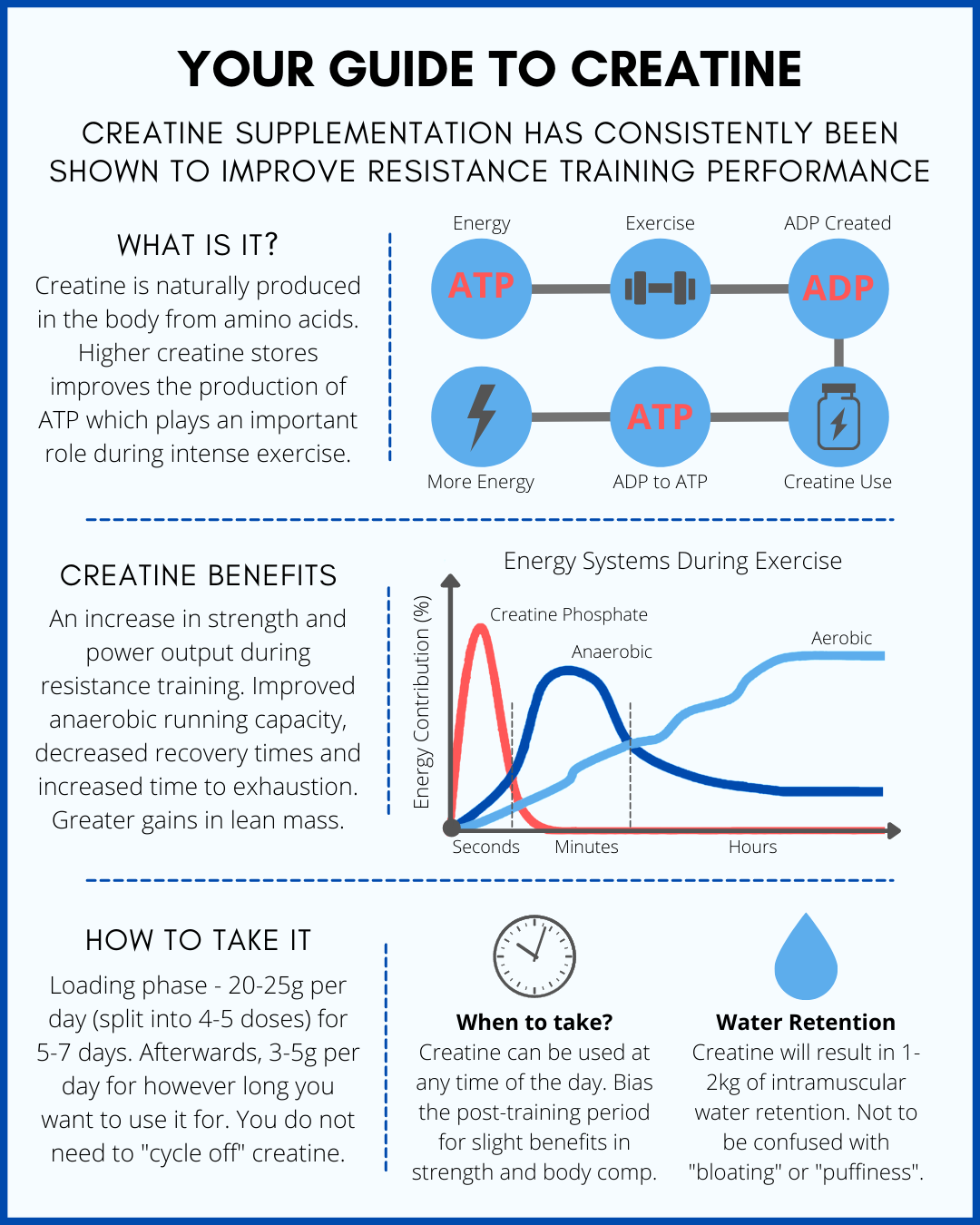Creatine For Muscle Growth: Benefits And Considerations

Table of Contents
How Creatine Works for Muscle Growth
Creatine's effectiveness stems from its impact on cellular processes crucial for muscle growth and performance.
Creatine's Role in ATP Production:
High-intensity exercise relies heavily on adenosine triphosphate (ATP), the primary energy currency of cells. Creatine supplements increase phosphocreatine stores in muscles. This is vital because phosphocreatine acts as a rapid reservoir, replenishing ATP during periods of intense exertion. This process, known as ATP resynthesis, is key to sustaining power output during weightlifting sets, sprints, and other high-intensity activities.
- Creatine is taken up by muscle cells and converted to phosphocreatine.
- During high-intensity exercise, phosphocreatine rapidly donates a phosphate group to ADP (adenosine diphosphate), regenerating ATP.
- This enhanced ATP regeneration leads to increased muscle energy availability, improving strength and power output.
Creatine's Effect on Muscle Protein Synthesis:
Beyond its immediate energy-boosting effects, creatine may also stimulate muscle protein synthesis, the process responsible for building new muscle tissue. This anabolic effect contributes to muscle hypertrophy (muscle growth). While the exact mechanisms are still being investigated, evidence suggests that creatine may activate the mTOR pathway, a critical signaling pathway involved in muscle protein synthesis.
- Studies have shown a link between creatine supplementation and increased rates of muscle protein synthesis.
- Creatine may enhance the anabolic response to resistance training, promoting greater muscle growth.
- The mTOR pathway activation is a potential mechanism behind creatine's effect on muscle protein synthesis.
Benefits of Creatine for Muscle Growth
The evidence strongly supports creatine's ability to enhance various aspects of muscle growth and performance.
Increased Strength and Power:
Numerous studies have demonstrated creatine's ability to improve strength and power output. This is particularly evident in high-intensity activities like weightlifting. Increases in 1RM (one-repetition maximum) are commonly observed among creatine users, indicating significant strength gains.
- Creatine supplementation leads to notable improvements in strength-based exercises such as squats, bench press, and deadlifts.
- Enhanced ATP resynthesis allows for more explosive movements and increased power output.
- Improved strength is a cornerstone of effective muscle growth.
Enhanced Muscle Mass:
Creatine's impact extends beyond strength gains. Many studies reveal that creatine supplementation significantly increases lean muscle mass and improves overall body composition. This muscle hypertrophy is a direct result of both enhanced strength and stimulated muscle protein synthesis.
- Studies consistently demonstrate increases in lean body mass with creatine supplementation, particularly when combined with resistance training.
- Creatine's ability to increase muscle cell volume (cell volumization) contributes to its muscle-building effects.
- The combination of increased strength and muscle protein synthesis leads to significant gains in muscle mass.
Improved Exercise Performance:
Creatine enhances not just strength but also overall exercise performance. The increased muscle energy availability allows for more intense and frequent workouts, further supporting muscle growth. Improved muscle endurance and faster recovery times are also frequently reported by creatine users.
- Creatine supplementation enables individuals to perform more repetitions and sets during weight training.
- It helps to reduce fatigue during high-intensity interval training (HIIT) and other strenuous activities.
- Faster recovery times between training sessions allow for more frequent workouts, promoting muscle growth.
Considerations and Potential Side Effects of Creatine
While creatine offers significant benefits, it's essential to address potential side effects and considerations for safe use.
Potential Side Effects:
The most commonly reported side effects of creatine are generally mild and temporary. These include water retention, leading to slight weight gain, and gastrointestinal issues such as stomach cramps or diarrhea. However, these side effects are not experienced by all users, and their severity often depends on individual factors and dosage.
- Water retention is primarily due to creatine's ability to attract water into muscle cells.
- Gastrointestinal discomfort is usually manageable and often resolves with proper hydration and gradual dosage increases.
- These effects are typically temporary and subside after discontinuation of use.
Dosage and Cycling:
The typical creatine dosage involves a loading phase followed by a maintenance phase. A loading phase involves taking 20 grams daily for 5-7 days to rapidly saturate muscle creatine stores. The maintenance phase then involves 3-5 grams per day to maintain these levels. Cycling creatine (periods of use followed by periods of rest) is a common practice, although its necessity remains debated.
- Loading phase: 20 grams per day for 5-7 days.
- Maintenance phase: 3-5 grams per day.
- Consult a healthcare professional for personalized recommendations.
Who Should Avoid Creatine:
While generally safe for healthy individuals, some groups may benefit less from or should avoid creatine. Those with pre-existing kidney conditions should exercise caution and consult their doctor before using creatine.
- Individuals with kidney disease should avoid creatine supplementation.
- Pregnant or breastfeeding women should consult a doctor before using creatine.
- Individuals with certain medical conditions should seek professional advice before using creatine.
Conclusion:
Creatine for muscle growth offers substantial benefits, including increased strength and power, enhanced muscle mass, and improved exercise performance. However, potential side effects such as water retention and gastrointestinal issues should be considered. Proper dosage, including a loading phase and maintenance phase, is vital. Remember, it's always best to consult with a healthcare professional before starting any new supplement regimen to ensure its suitability for your individual needs and health status. Learn more about optimizing creatine for muscle growth and achieving your fitness goals by researching reputable sources and consulting with fitness professionals.

Featured Posts
-
 Analyzing Warner Bros Pictures 2025 Cinema Con Presentation
May 17, 2025
Analyzing Warner Bros Pictures 2025 Cinema Con Presentation
May 17, 2025 -
 North Dakotas Leading Philanthropist Receives Msum Honorary Degree
May 17, 2025
North Dakotas Leading Philanthropist Receives Msum Honorary Degree
May 17, 2025 -
 Donald Trump Family Tree Tiffany And Michaels Baby Alexander Expands The Dynasty
May 17, 2025
Donald Trump Family Tree Tiffany And Michaels Baby Alexander Expands The Dynasty
May 17, 2025 -
 Angel Reeses Dpoy Accomplishment And Injury Update
May 17, 2025
Angel Reeses Dpoy Accomplishment And Injury Update
May 17, 2025 -
 Deepfake Detection Foiled Cybersecurity Experts Clever Technique
May 17, 2025
Deepfake Detection Foiled Cybersecurity Experts Clever Technique
May 17, 2025
